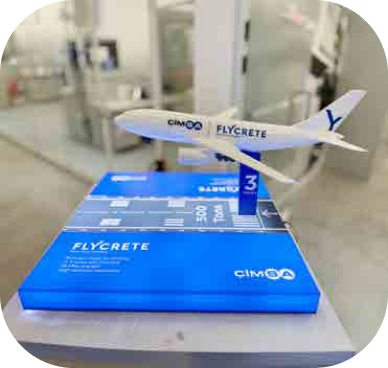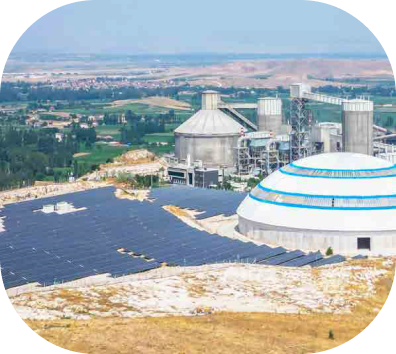In 2023, Building Materials Group
made significant strides in
decarbonization; transitioning
from a conventional cement
producer to an electricity self�sufficient cement player with
best alternative fuel ratio in
Türkiye while strengthening also
its global position.
7.1
million tons
5.8
million tons
23%
57%
23%
29%
3 integrated plants,
4 domestic terminals,
2 ports
4 integrated plants,
1 grinding station in the US,
5 international terminals
Capacity
Capacity
FX in Revenue
FX in Revenue
Alternative Fuel Usage in
Grey Cement
Alternative Fuel Usage in
Grey Cement
Production Facilities
Production Facilities


In 2023, the Turkish cement sector outperformed expectations with robust 20% growth year-on-year. Acceleration of sector growth was driven mainly from urbanization projects in the country’s earthquake regions. Sabancı Holding building materials strategic business unit (SBU)’s sustainable business model received substantial support from new investments and initiatives. In 2023, Sabancı Building Materials SBU made significant strides in decarbonization; transitioning from a conventional cement producer to a more self-sufficient electricity producer cement player while strengthening its global position.
Grow & Protect the Core
With business operations in seven countries, Building Materials Group have bolstered their potential with the integration of the Bunol plant in Spain. In line with its goal of expanding in international markets, Çimsa Americas has initiated a USD 82 million investment in a new gray cement grinding mill in Houston, Texas set to be completed by 2025. With an annual capacity of 600,000 tonnes, this new facility aims to strengthen the Group’s presence in this massive market
Currently, Group is active in the Americas region with a 300,000- ton white cement grinding plant and substantial highvolume exports originating from Çanakkale, Türkiye and other facilities.
At present, the business unit is focused on optimizing its domestic and global network and effectively harnessing network synergies. Toward this end, Çimsa acquired a controlling stake in Sabancı Building Solutions B.V. from Sabancı Holding in 2023. This strategic move is aimed at expediting the SBU’s international expansion efforts. Over the past year, Building Materials SBU bolstered its global presence, strengthening its position as the premier provider of white cement in the western hemisphere. Thanks to its steady expansion into diverse regions like North America, South America, and Europe, Group strategically position itself in closer proximity to clients. Building Materials SBU aims to be the preferred choice among cement users globally.
In 2023, Building Materials companies exceeded their targets by significantly boosting alternative fuel use, incorporating more alternative raw materials, and reducing the clinker usage ratio. Alternative fuels account for an average of 25% of total fuel consumption, far outpacing the 10% average in Türkiye. Group shapes its investments in line with its sustainability goals. This year, a solar energy production power plant in Afyon with an investment of TL 52 million was launched. Additionally, another solar power plant investment at the Bunol facility worth EUR 4.2 million was initiated. This latest solar power plant is scheduled to become operational in early 2024 and cover 16% of total energy consumption of Bunol plant. Simultaneously, Building Materials SBU announced its waste-heatrecovery investment at Eskişehir plant. The waste-heat-recovery unit is expected to be operational by the end of 2024 and cover 25% of the total energy consumption of the Eskişehir plant.
Sabancı Group Building Materials companies continuously increase their efforts to combat the global climate crisis and refine their eco-friendly exemplary practices. The Sustainable Product Movement initiative supports the sustainability goals of the building materials SBU by prioritizing nature-friendly products like Ecocrete without compromising on the fundamental performance parameters of production and quality. This year, a high-value added product Flycrete was introduced. This innovative solution is specifically tailored for airports where rapid maintenance and repair work is necessary. Flycrete enables runways to be ready for flights within three hours after application. Building Materials SBU aims to further strengthen its commitment to sustainability by developing and introducing additional innovative products and solutions.
Growth in New Platforms
Calcium Aluminate Cement (CAC) is a pivotal component in the transformational strategy of Building Materials SBU. This specialized product holds significant value in the construction industry, bridging the gap between cement and construction chemicals for the Group. Çimsa announced a USD 45 million investment to double its calcium aluminate production capacity at its Mersin plant last year. The capacity expansion investment became operational in the last quarter of 2023. As Türkiye’s one and only CAC producer, Çimsa became the third largest producer globally with this major capacity increase investment. The expanded production capacity will be primarily dedicated to exports, targeting the US and European markets. This significant investment aligns with Sabancı Group’s commitment to sustainable investments, aiming to deliver high value while maintaining low CO2 intensity. Building Materials companies are continuously searching for innovative technologies and solutions in the construction and advanced building materials industries. Through a partnership with Zacua Ventures, Group has invested in 10+ start-ups indirectly while making a direct investment in FenX, a Zürich based waste-derived sustainable insulation material producer. With FenX, portfolio of direct start-up investments increased to three: Ecolocked, Ecoworks, and FenX.

This year, Sabancı Technology Center in Munich became operational. This newly established university-industry collaboration platform between Technical University of Munich and Building Materials SBU extends the unit’s R&D, technology, and sustainable product development capabilities to the international arena in a major way. This center will significantly contribute to Sabancı Holding’s vision of being “Sabancı of the World” and the promise of “Uniting Türkiye and the World.” To further this aim, in November, the Building Materials SBU hosted the first Innovation and Inspiration Day at Sabancı Technology Center with the participation of academics from Europe’s leading universities as well as Sabancı Group’s building materials customers.
The Way Forward
A slight slowdown from this year’s rapid expansion is forecast in the domestic market’s performance in 2024. With many ongoing large-scale construction projects nearing completion and interest rates on the rise, domestic cement consumption in Türkiye is expected to slow from its breakneck pace of 2023. Expanding capacities of local players will intensify domestic competition and squeeze profit margins.

In export markets, Türkiye faces adverse effects from both the Russia-Ukraine and IsraelPalestine conflicts. Growing competition in export markets is also putting pressure on profit margins. Stagnation in the Chinese market spurred Vietnamese cement producers to redirect their focus to the American market, resulting in surplus supply and subsequent price pressures. North-African producers, backed by low production costs and investments in port facilities, have now emerged as competitive players in export markets within the global cement industry.
To maintain its strong market position, Building Materials SBU is committed to becoming a globally recognized portfolio specialized in sustainable building solutions. Efforts toward these ends are focused around sustainability. In alignment with Sabancı Holding’s 2050 sustainability targets, the Group’s building materials SBU has formulated a comprehensive CO 2 reduction roadmap. This roadmap encompasses a wide spectrum of action items, including further reducing the clinker usage ratio, integrating more alternative raw materials, and aggressively expanding alternative fuel use. In addition, the CO 2 reduction roadmap is aimed at diversifying the portfolio towards sustainable building materials other than cement via potential acquisitions.
